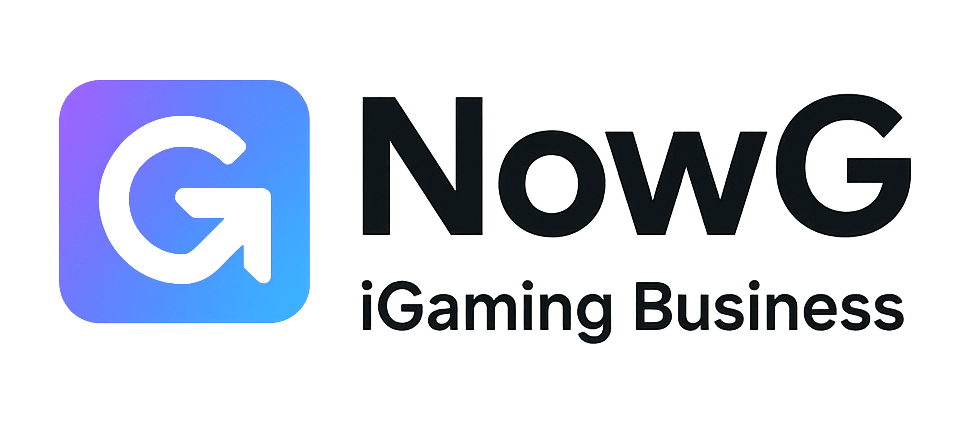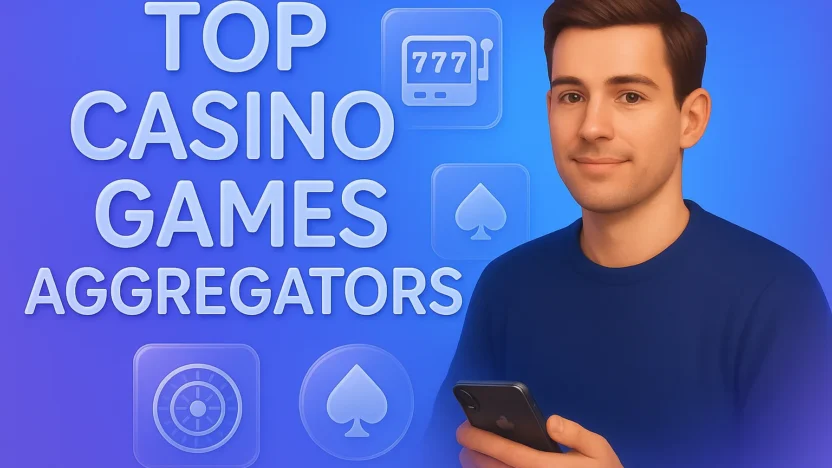Last Updated on November 13, 2025 by Caesar Fikson
Casino game aggregators are how you add thousands of online casino games—video slots, live dealer games, crash games, roulette, blackjack, jackpot games—from dozens of studios through a single contract and API. Demand keeps climbing with the online share of Europe’s gambling revenue hitting ~39% in 2024, while global online gambling is projected to reach $153.6B by 2030. For you—an operator, affiliate-turned-brand, or B2B vendor—the question isn’t whether to aggregate; it’s which aggregator, and under what commercial and technical constraints.
We write this from the trenches at NowG.
Our bias is simple: get you live quickly with a sane gaming portfolio, keep latency tight, and give your CRM clean levers—free rounds, jackpots, missions—without weeks of custom glue code. Below you’ll find a pragmatic shortlist and a way to compare apples to apples, not press releases to promises.
Aggregator 101: when it beats direct studio deals
Direct integrations give you control. Aggregators give you velocity. If your roadmap includes frequent new market entries, broad casino game selection, and fast experiments (new live tables, crash formats, fresh video slots), an aggregator removes months of legal and technical friction. You’ll trade a small margin for speed—and in a market where winners ship faster, that’s a trade worth making.
💡 Pro tip: Don’t ask “Who has the most titles?” Ask “Which casino software providers already whitelisted my payment stack and target jurisdictions?” Coverage—not vanity counts—determines your time-to-first-spin.
How to compare casino game aggregators (2026 reality)
We recommend you score vendors across six buckets: (1) coverage (studios + markets); (2) UX capabilities (free rounds engine, jackpots, lobbies); (3) performance (latency, uptime, CDN strategy); (4) operations (reporting, reconciliation, RTP/volatility metadata, release cadence); (5) commercials (fees, rev-share passthroughs, minimums); (6) risk & support (incident response, versioning, change windows). Keep the language in your notes brutally plain: “fast,” “mid,” “pain.”
| Criterion | What you need | Reality check |
|---|---|---|
| Game coverage | Top studios (Pragmatic Play, Evolution Gaming, Playtech, BGaming, Ezugi) + long tail | Ask for a live markets × studios matrix—no PDFs, a CSV you can filter |
| UX levers | Free rounds, jackpots, missions, lobby widgets | ✅ if native; ◻️ if “coming soon”; ❌ if “integrate it yourself” |
| Latency/uptime | Stable spin-to-result on mid-range Android; clear SLA | Demand real logs and incident summaries from peak hours |
| Ops & data | Unified reporting; RTP/volatility metadata; error codes that help | Ask for sample exports and error catalog upfront |
| Commercials | Transparent rev-share passthroughs; minimal hidden fees | Watch for platform + aggregator double-charges |
| Support | Named CSM; planned release calendars; rollback policy | Friday-night incident history tells the truth |
Have you considered the downstream impact of choosing an aggregator that can’t push volatility metadata into your CRM?
Without clean metadata, your “personalization” becomes guesswork. RTP ranges, volatility flags, and game categories are what make missions and offers feel intelligent, not spammy.
The shortlist: top casino game aggregators to evaluate
This is a buyer’s list. We’re not here to crown a winner; we’re here to help you pick the right fit for your stack, markets, and player preferences. All of these are credible; your context decides.
Pariplay Fusion
Strong regulated-market footprint and a mature aggregation layer built around its Fusion platform. Good fit if your roadmap spans Europe and North America with heavy focus on live dealer games and responsible, data-rich operations. Solid marketing widgets and a deep bench of casino game providers across video slots, instant-win, and table games.
EveryMatrix CasinoEngine
CasinoEngine tends to show up in professional stacks that value reporting depth and enterprise guardrails. If you need robust back-office tooling, frequent new releases, and consistent game provider reputation across multiple brands, this is a pragmatic pick. Integrates well if your sportsbook lives elsewhere and you want clean cross-sell to casino game types.
SOFTSWISS Game Aggregator
Wide content footprint and active in many regulated markets. We’ve seen fast time-to-content and a straightforward approach to operational controls. Strong selection across video slots, jackpot games, crash games, roulette games, and blackjack games, with simple APIs and responsive support—useful when your team isn’t massive and you still want scale.
Relax Gaming (Powered By / Silver Bullet)
Technically polished, with a reputation for performant delivery and a curated set of casino game studios via its partnership programs. If you care about perceived quality—spin cadence, hit frequency feel, and top-tier studios—Relax is worth deep consideration. Live tables are typically via partners; slots quality is the star here.
Pariplay’s peers: Light & Wonder OpenGaming
OpenGaming is a heavyweight distribution layer, particularly strong if your portfolio strategy leans on brand IP and well-known franchises. If your campaign calendar thrives on recognizability, plug this in early. Good enterprise muscle for operators who value stability above flash.
Bragg / Oryx (Powered by Bragg)
Historically strong in central/eastern Europe with broad coverage into other regulated markets. If your plan includes a lot of mid-market territories and you want tight programmatic releases and data, this can slot in nicely. Look for its promotional toolbox to power up your CRM missions without heavy engineering.
Hub88
Lean, API-first aggregator with a reputation for fast integrations and a friendly developer experience. Good option if you want to move quickly, especially for mobile-first audiences. Works well when you need to test many casino game types rapidly and you don’t want a heavy enterprise back-office on day one.
Groove
Broad, commercially flexible aggregator popular with ambitious mid-size operators. If you care about fast onboarding of niche providers to hit specific player segments, Groove’s catalog and account management are a plus. Useful when your casino marketing requires constant fresh content for player engagement.
BlueOcean Gaming (GameHub)
Steady “workhorse” aggregator with wide studio coverage. It’s a fit for teams who want dependable delivery, straightforward commercials, and modest engineering fuss. Often paired with operators testing new regions or launching secondary brands where cost control matters more than fancy widgets.
REEVO (content + aggregation)
Hybrid model—studio plus aggregation—with an emphasis on speed-to-market and frequent drops. If your brand strategy is content-forward with constant theme refreshes, REEVO’s cadence helps. Pair with a strong live dealer supplier (Evolution Gaming or Ezugi live games) to cover the table depth.
Quick comparison (features & fit)
| Aggregator | Best for | Live dealer | Free rounds | Jackpots | Reporting depth |
|---|---|---|---|---|---|
| Pariplay Fusion | Multi-market scale | ✅ via partners | ✅ | ✅ | ✅ |
| EveryMatrix CasinoEngine | Enterprise control | ✅ via partners | ✅ | ✅ | ✅ |
| SOFTSWISS | Breadth + fast rollout | ✅ via partners | ✅ | ✅ | ✅ |
| Relax Gaming | High-polish slots | ◻️ (partner-led) | ✅ | ✅ | ✅ |
| OpenGaming | Brand IP & scale | ✅ via partners | ✅ | ✅ | ✅ |
| Bragg/Oryx | CEE & regulated mix | ✅ via partners | ✅ | ✅ | ✅ |
| Hub88 | Dev-speed, agility | ✅ via partners | ✅ | ◻️ | ◻️ |
| Groove | Commercial flexibility | ✅ via partners | ✅ | ◻️ | ◻️ |
| BlueOcean GameHub | Reliable breadth | ✅ via partners | ◻️ | ◻️ | ◻️ |
| REEVO | Fast content cadence | ◻️ (partner-led) | ✅ | ◻️ | ◻️ |
💡 Pro tip: In your RFP, request two demo environments: one fat-pipe EU node and one throttled mobile node. If the aggregator’s “smooth” dies on weak connections, your live online casino software experience will, too.
Commercials that won’t bite you later
When you hear “cheap casino software,” watch the fine print. Aggregators typically take a platform fee + pass through studio rev-shares. The traps are double-charging (your platform + the aggregator), minimum guarantees that don’t reflect seasonality, and charges for basic ops (data exports, sandbox resets). Push for tiered pricing based on active monthly uniques and clear language around free rounds and jackpot costs.
For early-stage validation, you can absolutely start with free casino software components—online casino software free demos, igaming software free widgets, even “software igaming free” landing pages—to pressure-test your casino game offerings before you lock a long contract. Then step up to the aggregator that fits your scale.
Tech due diligence: non-negotiables
Your players experience pixels, sound, and speed. Under the hood, insist on: REST/GraphQL game APIs with versioning; CDN edge selection; clear error taxonomies; session-token rotation; and event webhooks for spin_start, round_end, bonus_trigger, jackpot_win. If you run user-friendly casino software on mid-range Android, test live dealer streams under real load—advanced streaming technology matters more than the brochure admits.
For CRM, the big unlock is metadata: RTP ranges, volatility banding, game categories, studio tags, and release dates. Your missions, retention ladders, and player engagement levers live or die on this data being structured and timely.
Content curation: make the lobby think
Dumping everything into a lobby is not a strategy. Curate casino game categories around player intent: fast-hit crash games for impulse, table time with live blackjack games and roulette games, sticky jackpots to anchor promotions. Rotate Pragmatic Play drops for pace, fold in BGaming games for agile theming and collabs, anchor live with Evolution Gaming and Ezugi live games, and use Playtech casino games to cover breadth and classic features. Build a gaming portfolio that mirrors your segments: new, value, VIP.
Frustrating when promising campaigns plateau unexpectedly, isn’t it?
Nine times out of ten, it’s pacing (too slow to a first meaningful action) or discovery (wrong game types surfaced). Fix that and your CPA mysteriously falls.
Hypothetical scenario: the aggregator switch that paid for itself
Picture this: a mid-size brand live in three markets, running a generalist aggregator. Conversion is fine, but session depth is flat and live dealer abandonment spikes on Fridays. We at NowG audit the stack: round-trip times vary wildly by region; jackpots require manual CSVs; volatility metadata arrives weekly, not hourly. We run a bake-off with two aggregators. Aggregator A wins on studio coverage but loses on latency. Aggregator B has fewer studios but offers edge-cached rounds and real-time metadata. We switch. Within 30 days, time-to-first-spin drops by 18%, table-switch latency falls under 300ms, and mission completion rises by 22%. Same media spend, better economics, quieter support. The “cost” of switching? A quarter of the bonus budget you were burning anyway.
Your RFP checklist (steal this)
| Ask for | Why | What “good” looks like |
|---|---|---|
| Studios × markets CSV | Validate availability by region | Filterable sheet, updated weekly |
| Latency/uptime logs | Friday-night truth serum | Graphs + incident postmortems |
| Promotion toolbox demo | Free rounds, jackpots, missions | Live config, not slides |
| Metadata catalog | RTP, volatility, categories | Webhooks + field dictionary |
| Commercial summary | Kill hidden fees | One-pager + sample invoice |
| Rollback policy | Protect your weekends | Documented, tested in sandbox |
💡 Pro tip: Shadow-test two aggregators in parallel for eight weeks. Mirror the same traffic slice; log seed IDs for replays; compare drop-offs at round_end, bonus_trigger, and lobby_return. Repaper contracts with data, not vibes.
SEO side quest (useful, not spammy)
If you run iGaming Business content or gambling affiliate marketing, embed playable demos and “explainers” around casino game types—what volatility means, how jackpot games differ from local vs networked, live dealer etiquette. The best online casino game software stack is the one that teaches while it converts. That’s how you win post-click, not just in the SERP.
Final thought
The aggregator you pick is less about “most games” and more about how fast your team can merchandise, measure, and move. Choose partners that make speed and clarity feel normal. You’ll feel it in your NGR faster than any rebrand.
Try NowG’s free tools to prototype funnels, benchmark round-trip times, and sanity-check your lobby before you commit.
FAQ
What is a casino game aggregator?
A content hub that lets you integrate hundreds of providers and thousands of online casino games via one contract and API—covering video slots, live dealer games, table games, crash, and jackpots.
When should I use an aggregator over direct integrations?
Use an aggregator when speed, market coverage, and operational simplicity matter more than shaving a few basis points. It’s ideal for multi-market roadmaps and frequent content refreshes.
Which aggregators should I shortlist in 2026?
Start with Pariplay Fusion, EveryMatrix CasinoEngine, SOFTSWISS Game Aggregator, Relax Gaming, OpenGaming, Bragg/Oryx, Hub88, Groove, BlueOcean GameHub, and REEVO. Fit depends on your markets and stack.
What features matter most day to day?
Fast time-to-first-spin, table-switch latency, free rounds and jackpots, reliable reporting, and structured metadata (RTP, volatility, categories) that drives CRM and personalization.
Do aggregators include live dealer games?
Yes—usually via partner streams from studios like Evolution Gaming or Ezugi. Validate stream latency and uptime during your own peak hours before signing.
How do I compare commercials fairly?
Demand a single-page pricing summary, example invoice, and clarity on passthrough studio rev-shares, free rounds costs, and any per-transaction fees. Watch for platform + aggregator double-charging.
Can free casino software help before I sign an aggregator?
Yes. Use free online casino software demos to test UX, player preferences, and messaging. When you see consistent engagement, plug in the aggregator that matches your roadmap.




